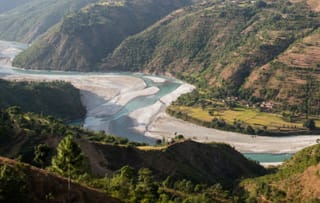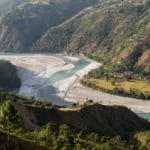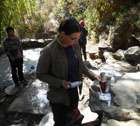
The Water Research project addresses the information gap existing in the field of water resource management. Nepal’s water resources continue to be depleted. While some water sources dry up, flash floods destroy homes and lives. And as existing water sources continue to be polluted with human, animal and chemical waste, remaining resources are inadequately managed. Industry, agriculture and an increasing population are all in competition for Nepal’s precious water resources.
More than 4.4 million people in Nepal do not have access to safe drinking water, either through municipal supply systems (pipes), wells, rainwater or bottled water. Over two thirds do not have access to improved sanitation facilities. Consequently, nearly 2000 Nepali children die from diarrhea related diseases every year. There are no satisfactory preventive measures like public awareness and sanitation programs provided by government or the non-government sector. Yet, there are not enough researches done in the field of water resource management in Nepal.
The goals of Water Research Project are to identify overall water management issues. The following are the specific objectives.
Water Resources
- Find out how many different types of water resources are available and how are they being used.
- Find out if the available water is appropriate for drinking. Identify the flow/volume of water. Find out if the volume is enough for the dependent families and if it can support other uses.
- Identify if there are any conflicts between the people using water.
- Promote alternative ways of fulfilling the demand like rainwater harvesting, ground water harvesting and other feasible techniques.
- Find out if there is any possibility of engaging a micro-hydro-power project.
Sanitation
- Determine whether the water source is contaminated by germs or chemicals. If so, identify them.
- Determine whether water storage tanks need to be maintained. Are there other ways of protecting the water sources?
- Determine the possibility of implementing simple water improvement and treatment techniques e.g. sedimentation tanks, constructed wetlands etc.
- Determine the level of sanitation awareness and ways to improve this.
- Develop Proper Plans to make multiple use of water, as this will help to reduce the competition for and conflict over access to water.
The study will help us and local governments to execute appropriate plans of action.
The volunteers will help us carry out overall water research projects by preparing study proposals, collecting and analyzing data, preparing a final report and presenting results to concerned stakeholders. We are looking for volunteers / interns who are passionate about water resource management. During the placement, the volunteers will live in a home-stay with a local Nepali family. You will get an opportunity to immerse in the local Nepali culture. You will also experience some of the challenges that the local communities face every day. Depending on your skills, the volunteer/ intern will carry out one or more of the following activities:
Related to Water Resources
- Classify the types of available water resources, their flow and the volume.
- Identify conflict over water because of significant need for irrigation, domestic use for drinking, industrial needs etc.
- Identify the ways in which water is used for economic and local industrial purpose like micro hydro power, water mills etc.
- Research the ways to promote and increase access to rainwater harvesting.
- Research the ways to promote ground recharge.
- Suggest proper plans to make multiple use of water, this will help to reduce the water stress effect.
- Find out the types of water resources is available and how are they being used.
- Find out if the available water is appropriate for drinking or not and whether there is sufficient water for the residents.
- Identify flow/volume of water and its sufficiency.
- Identify any conflicts over uses of water resources, if any.
- Study the possibility of micro-hydro-power project.
Related to Water Sanitation
- Find out if water sources are contaminated in any way
- Find out if water is being polluted and contaminated because of human behavior or natural causes.
- Suggest ways to maintain water storage tanks as a possible way of protecting the water sources.
- Assess the potential and ways to implement waste water treatment techniques like constructed wetlands.
- Assess the level of sanitation awareness and identify ways to improve it.
The research volunteer independently or with VIN staff prepares the research framework, methods, and tools; collects data; analyses data and prepares reports. The researcher will also have to build rapport with the local partners and stakeholders who will ultimately take ownership of the project.
Project Specific Skills
- Education or working background on Water / natural resource management
- Excellent research skills
- Excellent presentation skills
- Strong motivation for working rural communities
Desirable/ Common Skills
- Excellent communicator with good interpersonal skills
- A team player with good workethics
- Time management and leadership qualities
- Adaptable, flexible and able to work under pressure
- Accepting of different ideas and culture
- Problem solving: always be part of solutions than part of a problem
- Creative
- Positive attitude
Requirements
- Gender: Female / Male
- Minimum Age: 18+ years (16-17 years old person can volunteer but need to present parents’/ guardian’s consent letter)
- Language:English (Intermediate)
- Educational:High School Graduate
Your Experience/ Setting
Upon your arrival at Kathmandu Tribhuvan International Airport (TIA), you will receive a warm welcome and be transported to your hotel or hostel. If you are already in Nepal before the start of your placement, we can make alternative arrangements for you. You will undergo a comprehensive two- to three-day induction program after arrival. This induction will provide valuable information about your project and general information about the Nepalese language, culture, health, safety, and security. It is also an excellent opportunity to connect with fellow volunteers and interns who can become your companions for sightseeing and a source of support throughout your volunteer placement.
During the induction period, you will be accommodated in a budget hotel or hostel arranged by VIN. However, most of the VIN experience involves living with a Nepalese host family. While this immersion is essential for a complete experience, we understand that it can be challenging as you adapt to a new culture and adjust to facilities that may be more basic than you are accustomed to. Don’t worry; all our host families have experience accommodating volunteers, although their English-speaking abilities may vary. Also, you will have 24-hour access to our staff members for support and assistance throughout your placement.
Volunteers will be assigned to one of VIN’s working areas, which include Tarakeshor Municipality in Kathmandu, Taluwa, Thulachhap, and Bhadaure in Okhaldhunga, and Okharpouwa and Kaule in the Nuwakot district. While at the working site, volunteers are requested to bring their lunch box, water bottle, safety gear, face mask, and any other essential belongings. We advise volunteers to dress comfortably and modestly, preferably with long sleeves. Please get in touch with us for guidance and support if you want to raise project funds or collect project-specific resources. This will help the community a lot.
Schedule and Commitment
You will work five to six days a week, up to six hours per day. You may propose your preferred time and hours; however, the working time period will be dependent on the institution you have been placed. A minimum of 2 weeks’ time commitment is expected of a volunteer. The longer you commit; the better impact you can make. You should be willing to commit a certain amount of your free time and energy, show a lot of commitment and be a good listener. You are expected to work constructively and co-operatively maintaining good reputation and standards at all times. Volunteer should abide by relevant security concerns and access procedures. Moreover, you should be receptive and positive to performance appraisal, advice and feedback. Throughout your placement, you will have the full support of VIN. Your safety is our highest priority.
Your typical day might look like this:
| 07:00-08:00 | Tea/Leisure Time |
| 08:00-09:00 | Breakfast/Brunch (Nepali meal – Daal-Bhaat) |
| 09:00-10:00 | Preparation for sessions |
| 10:00-13:00 | Conduct Research |
| 13:00-14:00 | Lunch (Packed lunch) |
| 15:00-17:00 | Deliver sessions to people on cluster basis |
| 17:00-20:00 | Preparation for next day/Leisure time |
| 20:00-21:00 | Dinner (Nepali meal – Daal-Bhaat) |
You will receive a clear and concise on-the-job instructions, course of action, context of work and policies/strategies before your placement begins. You will be provided with ample of guidance and support throughout the placement with trainings / onboarding sessions incase necessary. You will be in a constant communication and regular check-in with the VIN volunteer coordinator. VIN aims to maintain a culture of continuous feedback between the volunteer supervisor at the placement to monitor the performance of the volunteer and ensure the project delivers desired outcomes.
In case of an emergency, you may contact one of our Volunteer Coordinators who will be available anytime for your assistance and support.
Click here to Learn more on how volunteering works
Mid and Long Term Volunteers:
2 weeks minimum stay- € 380
3 weeks – 480€
4 weeks – 580€ (after 4th week, for each additional week €95)
University Internships:
4 weeks minimum stay- € 680 (for each additional week – €105
Click here to Learn what’s included and excluded in our Fees Section
Click here to Learn recruitment process on how volunteering works
Our projects are open year-round, and our inductions begin on the first and third Mondays of each month. We would like to ask that volunteers arrive one day before the start of the induction. You can choose the duration of your participation based on your available time. However, so that you know, our volunteering placements are limited. We highly recommend booking your placement in advance to secure your placement. Click here to apply.



 Member of
Member of